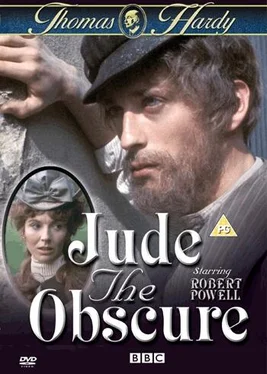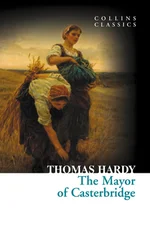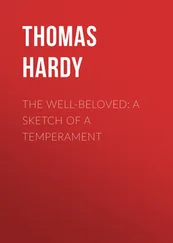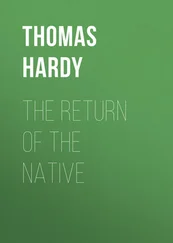"Don't say anything against my honour!" enjoined Jude hotly, standing up. "I'd marry the W–––– of Babylon rather than do anything dishonourable! No reflection on you, my dear. It is a mere rhetorical figure—what they call in the books, hyperbole."
"Keep your figures for your debts to friends who shelter you," said Donn.
"If I am bound in honour to marry her—as I suppose I am—though how I came to be here with her I know no more than a dead man—marry her I will, so help me God! I have never behaved dishonourably to a woman or to any living thing. I am not a man who wants to save himself at the expense of the weaker among us!"
"There—never mind him, deary," said she, putting her cheek against Jude's. "Come up and wash your face, and just put yourself tidy, and off we'll go. Make it up with Father."
They shook hands. Jude went upstairs with her, and soon came down looking tidy and calm. Arabella, too, had hastily arranged herself, and accompanied by Donn away they went.
"Don't go," she said to the guests at parting. "I've told the little maid to get the breakfast while we are gone; and when we come back we'll all have some. A good strong cup of tea will set everybody right for going home."
When Arabella, Jude, and Donn had disappeared on their matrimonial errand the assembled guests yawned themselves wider awake, and discussed the situation with great interest. Tinker Taylor, being the most sober, reasoned the most lucidly.
"I don't wish to speak against friends," he said. "But it do seem a rare curiosity for a couple to marry over again! If they couldn't get on the first time when their minds were limp, they won't the second, by my reckoning."
"Do you think he'll do it?"
"He's been put upon his honour by the woman, so he med."
"He'd hardly do it straight off like this. He's got no licence nor anything."
"She's got that, bless you. Didn't you hear her say so to her father?"
"Well," said Tinker Taylor, relighting his pipe at the gas-jet. "Take her all together, limb by limb, she's not such a bad-looking piece—particular by candlelight. To be sure, halfpence that have been in circulation can't be expected to look like new ones from the mint. But for a woman that's been knocking about the four hemispheres for some time, she's passable enough. A little bit thick in the flitch perhaps: but I like a woman that a puff o' wind won't blow down."
Their eyes followed the movements of the little girl as she spread the breakfast-cloth on the table they had been using, without wiping up the slops of the liquor. The curtains were undrawn, and the expression of the house made to look like morning. Some of the guests, however, fell asleep in their chairs. One or two went to the door, and gazed along the street more than once. Tinker Taylor was the chief of these, and after a time he came in with a leer on his face.
"By Gad, they are coming! I think the deed's done!"
"No," said Uncle Joe, following him in. "Take my word, he turned rusty at the last minute. They are walking in a very unusual way; and that's the meaning of it!"
They waited in silence till the wedding-party could be heard entering the house. First into the room came Arabella boisterously; and her face was enough to show that her strategy had succeeded.
"Mrs. Fawley, I presume?" said Tinker Taylor with mock courtesy.
"Certainly. Mrs. Fawley again," replied Arabella blandly, pulling off her glove and holding out her left hand. "There's the padlock, see… Well, he was a very nice, gentlemanly man indeed. I mean the clergyman. He said to me as gentle as a babe when all was done: 'Mrs. Fawley, I congratulate you heartily,' he says. 'For having heard your history, and that of your husband, I think you have both done the right and proper thing. And for your past errors as a wife, and his as a husband, I think you ought now to be forgiven by the world, as you have forgiven each other,' says he. Yes: he was a very nice, gentlemanly man. 'The Church don't recognize divorce in her dogma, strictly speaking,' he says: 'and bear in mind the words of the service in your goings out and your comings in: What God hath joined together let no man put asunder.' Yes: he was a very nice, gentlemanly man… But, Jude, my dear, you were enough to make a cat laugh! You walked that straight, and held yourself that steady, that one would have thought you were going 'prentice to a judge; though I knew you were seeing double all the time, from the way you fumbled with my finger."
"I said I'd do anything to—save a woman's honour," muttered Jude. "And I've done it!"
"Well now, old deary, come along and have some breakfast."
"I want—some—more whisky," said Jude stolidly.
"Nonsense, dear. Not now! There's no more left. The tea will take the muddle out of our heads, and we shall be as fresh as larks."
"All right. I've—married you. She said I ought to marry you again, and I have straightway. It is true religion! Ha—ha—ha!"
Michaelmas came and passed, and Jude and his wife, who had lived but a short time in her father's house after their remarriage, were in lodgings on the top floor of a dwelling nearer to the centre of the city.
He had done a few days' work during the two or three months since the event, but his health had been indifferent, and it was now precarious. He was sitting in an arm-chair before the fire, and coughed a good deal.
"I've got a bargain for my trouble in marrying thee over again!" Arabella was saying to him. "I shall have to keep 'ee entirely—that's what 'twill come to! I shall have to make black-pot and sausages, and hawk 'em about the street, all to support an invalid husband I'd no business to be saddled with at all. Why didn't you keep your health, deceiving one like this? You were well enough when the wedding was!"
"Ah, yes!" said he, laughing acridly. "I have been thinking of my foolish feeling about the pig you and I killed during our first marriage. I feel now that the greatest mercy that could be vouchsafed to me would be that something should serve me as I served that animal."
This was the sort of discourse that went on between them every day now. The landlord of the lodging, who had heard that they were a queer couple, had doubted if they were married at all, especially as he had seen Arabella kiss Jude one evening when she had taken a little cordial; and he was about to give them notice to quit, till by chance overhearing her one night haranguing Jude in rattling terms, and ultimately flinging a shoe at his head, he recognized the note of genuine wedlock; and concluding that they must be respectable, said no more.
Jude did not get any better, and one day he requested Arabella, with considerable hesitation, to execute a commission for him. She asked him indifferently what it was.
"To write to Sue."
"What in the name—do you want me to write to her for?"
"To ask how she is, and if she'll come to see me, because I'm ill, and should like to see her—once again."
"It is like you to insult a lawful wife by asking such a thing!"
"It is just in order not to insult you that I ask you to do it. You know I love Sue. I don't wish to mince the matter—there stands the fact: I love her. I could find a dozen ways of sending a letter to her without your knowledge. But I wish to be quite above-board with you, and with her husband. A message through you asking her to come is at least free from any odour of intrigue. If she retains any of her old nature at all, she'll come."
"You've no respect for marriage whatever, or its rights and duties!"
"What does it matter what my opinions are—a wretch like me! Can it matter to anybody in the world who comes to see me for half an hour—here with one foot in the grave! … Come, please write, Arabella!" he pleaded. "Repay my candour by a little generosity!"
Читать дальше












